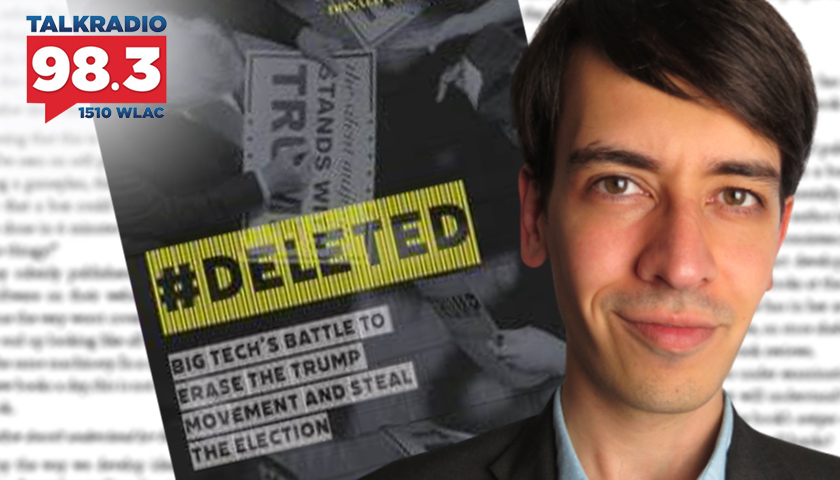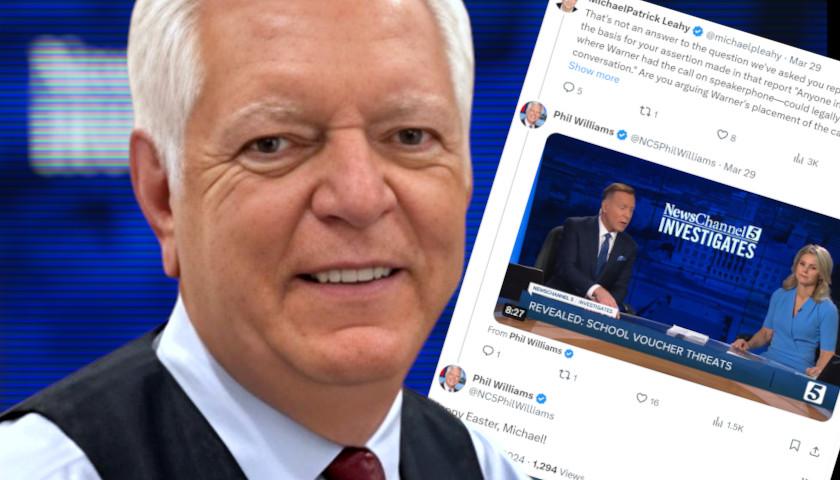Live from Music Row Wednesday morning on The Tennessee Star Report with Michael Patrick Leahy – broadcast on Nashville’s Talk Radio 98.3 and 1510 WLAC weekdays from 5:00 a.m. to 8:00 a.m. – host Leahy welcomed Breitbart News colleague Allum Bokhari to the newsmakers line.
During the second hour, Bokhari discussed his new book which #Deleted which talks about Google and other big tech platforms strategies to suppress conservative content and limit visibility to conservative or pro-Trump platforms. He added that both sides of the aisle in government were taking donations from Silicon Valley making it hard to amend Section 230 which now protects big techs from any legal due process.
Leahy: We are joined now by my good friend, Breitbart colleague, relentless journalist and author of the new book coming out on September 22nd called #Deleted: Big Tech’s Battle to Erase the Trump Movement and Steal the Election. Allum Bokhari, good morning Allum.
Bokhari: Good morning. Great to be on.
Leahy: I can’t wait to read this book. By the way, a tip of the hat to you, because you discovered one of the most important and chilling videotapes I’ve ever seen. In 2018 you had this one-hour videotape of Google employees like the day after Donald Trump was elected president. Just describe how you got that tape and what was found on that videotape.
Bokhari: So that one-hour tape was an all-hands company meeting at Google. They used to record these for their employees and distribute them to their employees. And one of the employees, who was very alarmed by what he saw in the meetings, sent the video to me anonymously by the way. We don’t know who sent it, because they didn’t use their real name.
It had the top leaders of Google and the co-founder Sergey Brin, Larry Page, CEO, and multiple other Google executives. Two days after the election of Donald Trump in 2016, as you can imagine they were all in absolute meltdown mode. They were completely open about their response to their election. Sergey Brin described it as an offensive election and compared Trump voters to extremists.
But more disturbingly, they started talking about what their plans were next in response to the election. This is where they went beyond personal feelings and personal opinions about the election, about how to use their technological power to make sure it didn’t happen again. We saw executives talking about Google’s anti-extremism program, which redirects people away from certain search results.
And they were talking about that not in the context of ISIS terrorists, but in the context of Trump voters. You also heard their legal team, Ken Walker, that the populist movement needed to be a blip or hiccup in history. It was more than just a company-wide group hug. It was that, but it was also a planning session of how to use Google’s vast control over information to make sure the Trump movement was contained.
Leahy: You spent four years since 2016 investigating these internet giants. Google, Twitter, YouTube, and Facebook. All a bunch of lefties in my view. According to your book description, you’ve discovered a dark plot to cease control of the flow of information, and utilize that power to its full extent to censor, manipulate, and ultimately sway the outcome of our democratic elections by basically using that power to influence undecided voters. Tell us more about what you’ve discovered, and what’s new in your book coming out on the 22nd of September.
Bokhari: It’s certainly not an exaggeration. My sources inside of these and other companies, they’ve been following this from the inside, and they’ve told me that all of the controls of these companies placed information after 2016 which they said in public were to control so-called misinformation. So-called fake news also called hate speech.
They also have departments to now monitor what they call election integrity. They don’t tell us what that means. But what my sources tell me is all the people that have joined the new departments were the most anti-Trump people at the company.
All these new ways they use to control information, which was conveniently set up after the election, and staffed almost by the most anti-Trump people at the companies. And that’s certainly not an accident because I think all of Silicon Valley, much like the elitist establishment in America, were caught off guard and were caught flat-footed by the election of Donald Trump in 2016. And I think Silicon Valley especially felt guilty for allowing it to happen. (Inaudible talk)
Leahy: 56 days, I think now, until the election. From what you’ve seen, are they succeeding in stealing the election?
Bokhari: Well there is plenty of stuff they’ve done out in the open. We’ve seen in the last four years that they’ve banned numerous high profile Trump supporters from their platform. These are people who had hundred of thousands of followers and reached millions of people. People like Paul Joseph Watson, Laura Loomer, Tommy Robinson in the UK, who is also a global phenomenon. They are censoring populists around the world. We’ve seen also at Breitbart News, Google cutting our visibility to almost by 97.3%.
That’s how much visibility we’ve lost on Google search since the 2016 election. They’ve completely suppressed us as the leading source of conservative news on the internet. So we’re seeing that happen in the open. What we don’t see, and what the book illuminates, is it goes behind the scenes and how big tech covertly suppresses content it doesn’t like. And it does this through algorithms that sort the content you see on your social media feeds or in your search results.
When you log on to one of these platforms you’re going to see something at the top of your screen, and that means there will be thousands and thousands of links that won’t appear at the top of your screen. What decides that? Big tech decides that. But they don’t tell us how they decide that. My sources point out that there is a whole political consideration that might go into what big tech places in front of us on our screens.
Leahy: Do you think in the next 56 days there will be any action taken at any level by any legal entity or political opposition to stop this trend? This nefarious plot, if you will, of Facebook, Google, YouTube, and Twitter to twist the outcome and steal the 2020 presidential election?
Bokhari: We are seeing some movement in the administration and in the Senate. Today we had a major bill being introduced by Republican senators to reform Section 230. That’s the law that gives tech companies the ability to censor without suffering any real legal consequences. It’s very difficult to take these companies to court if your account has been unfairly terminated.
Which is absolutely crazy by the way. If you are renting commercial property, and your landlord evicts you for arbitrary reasons, then you can take them to court. They have to follow a strict legal due process. But if your entire business depends on Facebook or YouTube, you can’t really take those companies to court, because they’ve successfully argued in court, thanks to this law, that they can suspend or ban people for any reason or for no reason. So we’ve seen Republicans introduce a bill to amend that today.
I don’t think it will get passed by the House, because Democrats know they need big tech censorship. We also see the administration putting a petition before the FCC to narrow the bounds of that crucial law. So we’ll see what happens there. I don’t think anything will happen before the election. Unfortunately, I think Republicans have really left it too late. And one of the reasons it happened, I think, is because big techs flood Republican lawmakers and Republican think tanks with donations. They try and control both sides of the aisle.
Leahy: You said something very important there. It’s not just the donations from Google, Facebook, YouTube, and Twitter to Republican lawmakers. Conservative think tanks get a lot of money from these guys too.
Bokhari: That’s correct. If you ever see an argument published in whatever publications these think tanks tend to like, like National Review saying well, if we interfere in these companies, or if we try and reform Section 230, or if we try and regulate them, or stop them from stealing or interfering in elections, or impose any type of oversight, then we are somehow interfering in the free market.
It’s a completely bogus argument, because they own their dominating position in the marketplace to these special legal privileges that Congress gave them in the 1990s, and that no other industry enjoys. That’s not a free market. That is a market that is propped up by government handouts. It tends to come from these so-called conservative think tanks.
Listen to the full second hour here:
– – –
Tune in weekdays from 5:00 – 8:00 a.m. to the Tennessee Star Report with Michael Patrick Leahy on Talk Radio 98.3 FM WLAC 1510. Listen online at iHeart Radio.
Photo “Allum Bokhari” and “#DELETED” from Hachette Book Group.








